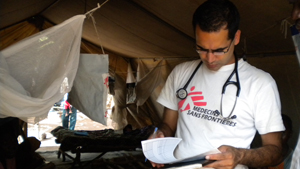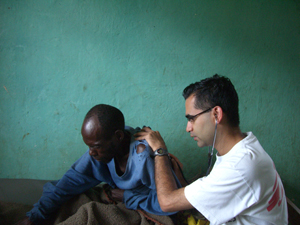"They're all human beings—it's all patient care. The physiology is the same, but so are the hopes and dreams—everyone wants to be healthy, their parents to be healthy, their kids to go to school. We're all the same," says Dr. Raghu Venugopal, an emergency physician at TGH. But the patients he's referring to are not in Toronto. They're in places like Central African Republic and Burundi—countries to which he's travelled as a volunteer with Médecins sans Frontières (MSF).
 Dr. Venugopal was inspired to work with MSF during medical school and first went abroad to the Balkans during the Kosovo war. Stints with MSF soon became part of his medical education, which includes McGill and a fellowship at Johns Hopkins University.
Dr. Venugopal was inspired to work with MSF during medical school and first went abroad to the Balkans during the Kosovo war. Stints with MSF soon became part of his medical education, which includes McGill and a fellowship at Johns Hopkins University.
MSF works with teams of international and local medical personnel, a system that Dr. Venugopal says benefits all sides. He recalls an incident where he was performing a spinal tap on a patient, which is normally done in Canada with the patient lying down. But the nurses in Burundi performed it with the patient sitting up, a technique he was able to learn from them.
MSF is most often associated with disasters, such as the 2010 earthquake in Haiti. But the need never disappears—once the initial crisis passes and the media leave, medical help is still needed. That's where Dr. Venugopal prefers to work—"I'm not sent to sexy places, but I'll go where they need a doctor."
 The work carries a personal cost—getting sick, he explains matter-of-factly, is just part of the package, and he has spent lengthy periods recovering from illnesses. There is also little respite during missions—he is always on-call, partly because of the huge need, but also because in the places where MSF works, an international doctor is never anonymous. At home, once you leave the hospital, no one knows you're a physician and you can truly be off-duty.
The work carries a personal cost—getting sick, he explains matter-of-factly, is just part of the package, and he has spent lengthy periods recovering from illnesses. There is also little respite during missions—he is always on-call, partly because of the huge need, but also because in the places where MSF works, an international doctor is never anonymous. At home, once you leave the hospital, no one knows you're a physician and you can truly be off-duty.
But it's also rewarding and fulfilling. He has a strong ap¬preciation of what we have here—not just of our health care system, but of our freedom and our rights here in Canada. He's also very grateful to Dr. Anil Chopra, who heads the ERs for TGH and TWH, as well as all his colleagues, who have accommodated his international work.
Ultimately, what keeps him going is the most basic part of medicine—saving lives.
"I can't change the world, and neither can MSF, but I can change individual lives. It's a great privilege and it's deeply humbling to see what people can endure."
